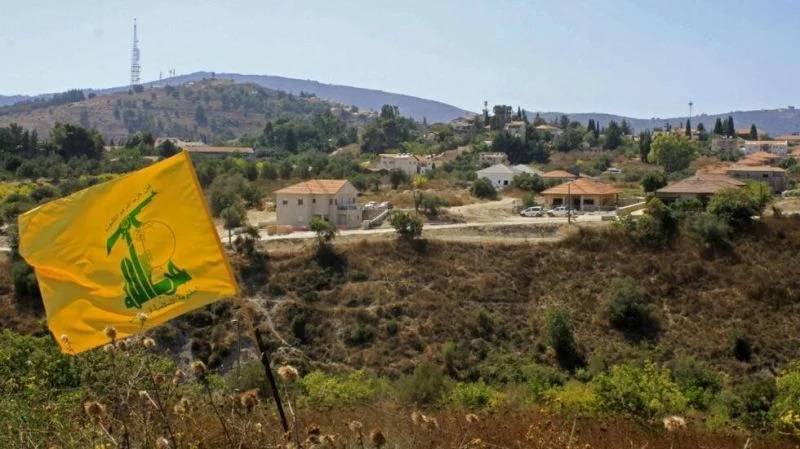
A Hezbollah flag flies on the border between Israel and Lebanon. (Credit: AFP file photo/Mahmoud Zayyat)
BEIRUT — The United States announced a series of sanctions Tuesday against seven Hezbollah members and financial facilitators in South America and Lebanon, accusing them of operating a network that "generates revenue for Hezbollah's terrorist activities and enables the terrorist group’s presence and nefarious activities in Latin America."
The US Department of the Treasury's Office of Foreign Assets Control (OFAC) said in a statement it has designated on its sanctions list Amer Mohamed Akil Rada, "who in addition to his role as a senior Hizballah operative, was one of the operational members of Hizballah who carried out the terrorist attack against the Asociacion Mutual Israelita Argentina (AMIA) in Argentina in 1994 that killed 85 people."
On July 18, 1994, a car bomb exploded at the AMIA Jewish Community Center building in Buenos Aires, killing 85 and wounding more than 300 people.
Amer "was also allegedly involved in the Israeli embassy bombing in Buenos Aires in 1992," the Treasury Department added.
Amer, who, according to OFAC, currently lives in Lebanon, manages, along with his associates, which include his brother and son, a commercial enterprise for Hezballah, including charcoal exports to Lebanon.
Samer Akil Rada, Amer’s brother, also a Hezbollah member, "has been actively linked to crimes related to illicit drug trafficking and money laundering in various countries in Latin America … He was also implicated in the shipment of 500 kilograms of cocaine worth approximately $15 million that were hidden in fruit shipments and ultimately seized in El Salvador," the Treasury Department said in its statement.
OFAC has also designated Amer's son, Mahdy Akil Helbawi, and his Colombia-based charcoal company Zanga S.A.S., "which has been the main supplier of companies controlled by individuals in this network," on its sanctions list.
"Zanga S.A.S. received transfers totaling approximately $40,000 from Lebanon-based company Black Diamond SARL, citing purchases of coal or charcoal. Ali Ismail Ajrouch is the owner of Black Diamond SARL," the Treasury Department added.
The sanctions demand blocking and reporting to OFAC "all property and interests in property of the individuals and entities named above, and of any entities that are owned, directly or indirectly, 50 percent or more by them, individually, or with other blocked persons, that are in the United States or in the possession or control of US persons."
Based on L’Orient Today’s analysis of 20 years of US sanctions designations, the number of Lebanese individuals and entities under current US sanctions has recently risen to 273 — the largest figure in at least 20 years.
On Aug. 10, the United States government made headlines in Lebanon by sanctioning former central bank governor Riad Salameh, his brother, son, assistant and partner for corruption and undermining the rule of law in Lebanon.
Just six days later, the US sanctioned Green Without Borders and its director, Zuhair Nahla, claiming that the self-described environmental NGO in fact works in service of Hezbollah, which the US considers a terrorist organization
The two rounds of August 2023 sanctions highlight the two main faces of US sanctions in Lebanon: corruption-related sanctions that are less common but often target high-profile individuals, such as the head of Free Patriotic Movement Gibran Bassil in November 2020; and the more numerous sanctions related to what the US considers terrorism, particularly Hezbollah members and affiliates.
The US has also issued two other broad categories of sanctions in Lebanon: narcotics and ties to the Syrian government.
